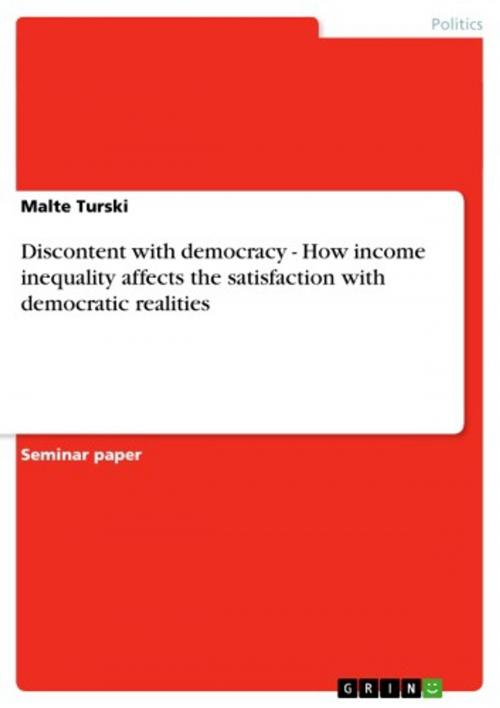Discontent with democracy - How income inequality affects the satisfaction with democratic realities
Nonfiction, Social & Cultural Studies, Political Science, International, International Relations| Author: | Malte Turski | ISBN: | 9783640848225 |
| Publisher: | GRIN Publishing | Publication: | February 28, 2011 |
| Imprint: | GRIN Publishing | Language: | English |
| Author: | Malte Turski |
| ISBN: | 9783640848225 |
| Publisher: | GRIN Publishing |
| Publication: | February 28, 2011 |
| Imprint: | GRIN Publishing |
| Language: | English |
Seminar paper from the year 2011 in the subject Politics - Basics and General, grade: 1,0, University of Aarhus (Institut for Statskundskab), course: Dissatisfaction with Democratic Politics and the Challenge of Populism, language: English, abstract: There can be little doubt that democracy has told a tremendous story of success in the last decades and has become state of the art in governing a state. After the defeat of socialism and the end of the Soviet Union the triumph of democracy was regarded as complete by many. Nevertheless a growing disenchantment with and alienation from democratic practice has been diagnosed. Whereas some perceive the change as just a transformation of political participation, others deem it to be a threatening erosion of support for democracy. It seems reasonable to suppose that personal failure in economic terms is tracked back to the political system and can lead to disappointment and alienation. A system that makes winners and losers is less likely to be embraced by the latter. Indeed, previous empirical research suggests that income inequality is detrimental to the satisfaction with democracy. This negative effect should be especially strong when the reduction of income differences is perceived as the responsibility of the government, i.e. when the expectations towards democracy regarding income distribution are disappointed. In order to facilitate the main statement of this paper it will first be argued that inequality of income is a cause for dissatisfaction with democratic politics in European developed economies. Then, and mainly, it is argued that the negative effect of income inequality on satisfaction with democracy is the larger the more the citizens want governments to take measures to reduce income differences. The aim of this paper is to extend the sparse empirically grounded literature by shedding more light on the causal link between income inequality and dissatisfaction with democracy. In particular, it shall be analyzed whether dissatisfaction is caused by a failure of democracy to live up to the expectations people have regarding social justice. Is dissatisfaction really a cognizant reaction to income inequality? The hypotheses are being tested based on data from the European Social Survey 2008.
Seminar paper from the year 2011 in the subject Politics - Basics and General, grade: 1,0, University of Aarhus (Institut for Statskundskab), course: Dissatisfaction with Democratic Politics and the Challenge of Populism, language: English, abstract: There can be little doubt that democracy has told a tremendous story of success in the last decades and has become state of the art in governing a state. After the defeat of socialism and the end of the Soviet Union the triumph of democracy was regarded as complete by many. Nevertheless a growing disenchantment with and alienation from democratic practice has been diagnosed. Whereas some perceive the change as just a transformation of political participation, others deem it to be a threatening erosion of support for democracy. It seems reasonable to suppose that personal failure in economic terms is tracked back to the political system and can lead to disappointment and alienation. A system that makes winners and losers is less likely to be embraced by the latter. Indeed, previous empirical research suggests that income inequality is detrimental to the satisfaction with democracy. This negative effect should be especially strong when the reduction of income differences is perceived as the responsibility of the government, i.e. when the expectations towards democracy regarding income distribution are disappointed. In order to facilitate the main statement of this paper it will first be argued that inequality of income is a cause for dissatisfaction with democratic politics in European developed economies. Then, and mainly, it is argued that the negative effect of income inequality on satisfaction with democracy is the larger the more the citizens want governments to take measures to reduce income differences. The aim of this paper is to extend the sparse empirically grounded literature by shedding more light on the causal link between income inequality and dissatisfaction with democracy. In particular, it shall be analyzed whether dissatisfaction is caused by a failure of democracy to live up to the expectations people have regarding social justice. Is dissatisfaction really a cognizant reaction to income inequality? The hypotheses are being tested based on data from the European Social Survey 2008.















